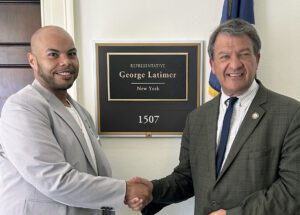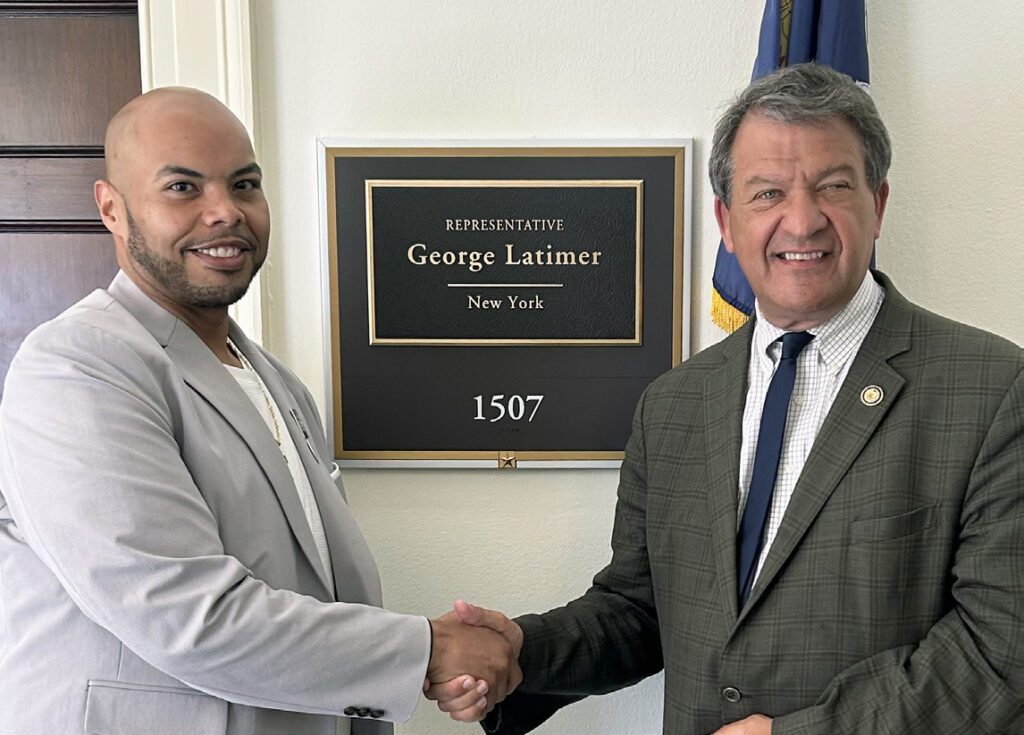CSEA activists recently traveled to Washington D.C. on separate trips to urge Congress to protect federal Medicaid funding.
The legislation, which had passed the House of Representatives and was pending in the Senate as this edition went to press, would devastate patients, the public workers who serve them and the communities they live in. The cuts would also harm the ability of health care facilities, including safety-net hospitals, to provide services.
Rural health care at stake
SUNY Fredonia Local President Stephanie Teachman recently joined our AFSCME family in Washington to urge for support for rural health care services.

“Hospitals in rural areas are already heavily reliant on Medicaid funding,” said Teachman. “We don’t have a lot of urgent cares; our hospitals are very spaced out. Brooks [Memorial Hospital] is the closest to me, and it’s 20 minutes away; the next closest is 40 minutes away. If you live in a community where it takes more than an hour for help to reach you, that’s not ideal.”
As part of the lobbying effort, Teachman met with many House members of the New York Delegation, who she said were aware of the stakes for her district, NY-23.
“One congressional staffer said they saw the coverage from our rally in Corning outside [U.S. Rep. Nick] Langworthy’s office and asked me about it,” Teachman said. “It was nice to know they’re paying attention.”
But not every member of Congress was as receptive. Teachman expressed frustration that her own representative, Langworthy, declined to meet with her.
“He claimed we didn’t give enough notice, which I don’t think is true,” said Teachman. “Even if he didn’t agree with what I was saying, it would’ve been nice if could’ve taken the time to listen or sent one of his staff to speak with me, as one of his constituents.”
Personal reasons

Westchester Medical Center Unit Vice President Ruben Bastell, a senior medical lab technician, recently also traveled to Washington D.C. to lobby alongside fellow AFSCME-represented health care workers to protect federal Medicaid funding.
For Bastell, the chance to fight for Medicaid is both professional and personal.
Nearly half of Westchester Medical Center (WMC) patients are on Medicaid, according to recent media reports, so cuts would deal a devastating blow to the hospital and impact the services provided there, which include a trauma center, burn unit, transplant services and a children’s hospital.
Outside of work, Bastell has witnessed how Medicaid is literally lifesaving.
“My little brother was born with chronic kidney disease in 2000, and without Medicaid, he wouldn’t be alive today,” said Bastell. “He’s 24 years old, he’s had two transplants, and years of dialysis treatment. It’s what keeps him alive. He relies on Medicaid for his care and that’s made this fight personal for me.”
Bastell joined a group of AFSCME-represented nurses from Michigan in making the rounds through the U.S. Senate and House of Representatives. He met with U.S. Rep. George Latimer, a longtime friend of CSEA, who assured Bastell he is fighting to preserve Medicaid.
Fight continues
Teachman, who had lobbied before the House had passed the bill, called the passage of the bill disappointing, particularly since amendments had been proposed that could have reduced the damage.
“It was more disappointing to know they chose not to do anything.” said Teachman.
Still, Teachman came away from the experience with renewed energy and perspective.
“On the Democratic side, they used a lot of personal stories, so you can tell that they reached out to [their constituents] and so that shows that your voice actually does matter,” said Teachman. “CSEA members need to know that these cuts don’t just impact people on Medicaid. They impact the people who process claims, who work in DSS offices, psychiatric centers, and nursing homes. These are our union members. These are our jobs.”
While Bastell has been a union activist for much of his 22 years working at WMC, this was his first time advocating at the federal level. His experience gave him a greater picture of our union strength on the national level.
“It was a great experience,” Bastell said. “I spoke with ABC News, which was a first for me. I was able to see all the different people and groups lobbying on different issues. I was even able to see a vote on the House floor. The AFSCME team was amazing, and it was pretty cool to see all the resources and staffing they have and how they work to make sure our voices are heard.”
Teachman said she sees it as her responsibility to keep members informed and motivated.
“I think it’s important to get the right information out, to help people understand and be informed,” said Teachman. “There’s more to fight. Hopefully, people learn from these decisions and hold politicians accountable at midterms.”
For those feeling discouraged, she offers a clear message.
“Just hang in there,” said Teachman. “Keep doing what we know is right and know that we have power in elections.”
— Sara McNicholas and Jessica Ladlee
